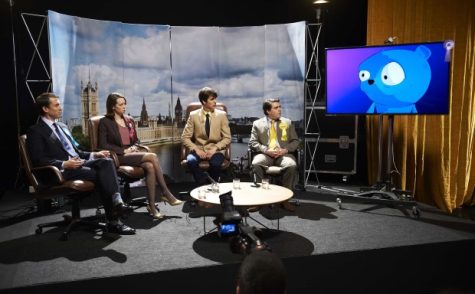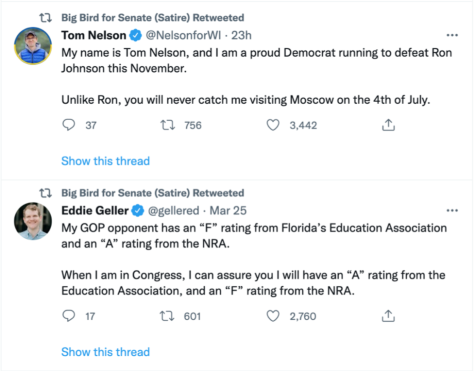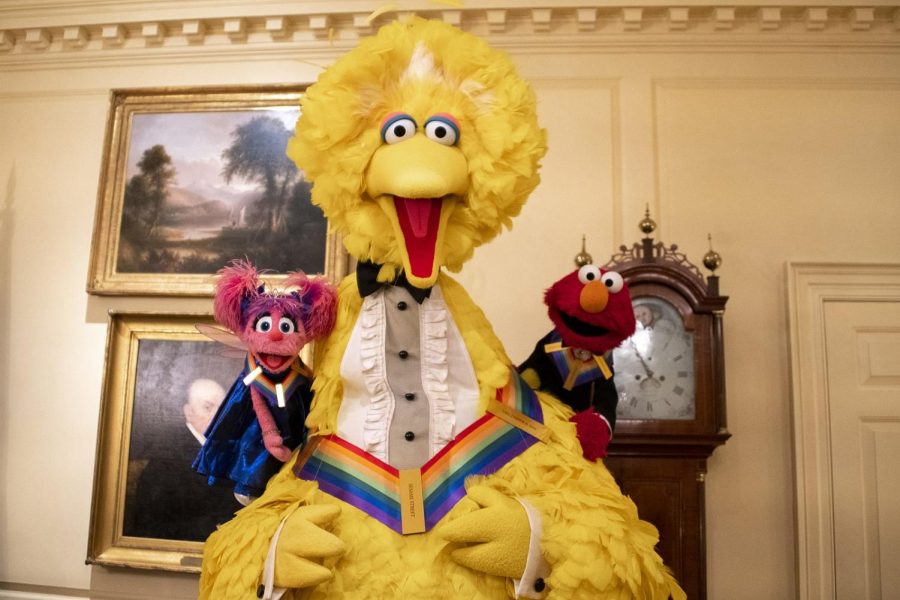Where does @SenatorBigBird lie in the satirical dilemma?
Emphasizing the importance of distinguishing between different forms of satire
Emphasizing the importance of distinguishing between different forms of satire
March 29, 2022
Big Bird is running for Senate.
On Nov. 6, 2021, the official Big Bird account, @BigBird, tweeted that they had just received the COVID-19 vaccine at the age of six — even though the character has been on TV for more than 50 years — and encouraged other children to get their dose too. Senator Ted Cruz of Texas tweeted back, calling it “government propaganda … for your five year old.”
Government propaganda…for your 5 year old! https://t.co/lKUlomnpq1
— Ted Cruz (@tedcruz) November 6, 2021
Within hours, the satirical account @SenatorBigBird, which is not associated with the official Big Bird, was created and made it their mission to outrun Cruz for his seat. @SenatorBigBird’s pledge is to “never fly away when Texas is in trouble,” alluding to when Cruz flew to Cancun during a power outage in Texas. With this message, @SenatorBigBird has thus far amassed over 100K followers.
As your next Senator, I will never fly away when Texas is in trouble. pic.twitter.com/xfnt6jG8Bk
— Big Bird for Senate (Satire) (@SenatorBigBird) November 10, 2021
Following the announcement, the cartoon bird also began recruiting their Sesame Street friends to help boost their political campaign. Within the month, they employed Cookie Monster as the campaign manager, Bert as the communications director, Grover as the grassroots organizing director, Count as the finance director, Ji-Young as head of DEI, Kermit as the director of outreach, Elmo as senior advisor, Ernie as political director, Oscar as opposition research director and Rosita as policy director.
Connecting these nostalgic names that were created to entertain children on Saturday mornings with professional political positions, one couldn’t help but roll their eyes at the clear publicity stunt. Cartoon characters running for Senate? It seems even more childish that 10 accounts have been created just to promote one cartoon bird’s election.
In the last year alone Ted Cruz has voted to decertify the election, abandoned Texans in their time of despair & promoted anti-vaccine culture.
All of the above endangered Texans and Americans. That’s why @SenatorBigBird is running to replace him.
— Bert (Comms Director) (@CommsDirectBert) November 9, 2021
There has been an increase in satirical accounts popping up on social media platforms recently due to the novelty of social media advocacy. But the issue isn’t that these accounts are being created, as satire is not inherently bad. A combination of art and humor used to reflect social criticism, it essentially acts as a direct method of calling politicians and their policies out with the eventual goal of bringing about change. However, the problem is what part of the satirical process these accounts champion and what side of the age-old satirical dilemma they fall in — it’s either change and criticality or mockery and attention.
Satire has always had an issue between balancing mockery and pushing for change, and to understand the opposing sides, we have to first understand why one is more detrimental than the other: satire that emphasizes on providing entertainment rather than generating change not only stagnates political awareness but also pushes it back.
This entertainment-based approach is portrayed in the Black Mirror episode, “The Waldo Moment,” where Waldo, a blue cartoon bear voiced by Jamie Salter (Daniel Rigby) announces that he’s running against the incumbent Liam Monroe (Tobias Menzies) for a seat in parliament after gaining popularity from his inappropriate jokes and criticism of modern politics. To gain exposure, Waldo attends election interviews through a virtual screen, interrupting the other candidates by insulting them and cursing at their policies.

Towards the end of the episode, the Green Party candidate, Gwendolyn Harris (Chloe Pirrie) calls out Waldo, essentially Salter, for promoting political apathy, arguing how the bear promotes nothing and at least she and Monroe stand for something.
The issue with satirical accounts like Waldo is summed up by a research paper published by Alice Yahhuei Hong and Roland Chang from “Scientific Research,” an academic publisher. They claim how political apathy and political antipathy can both emerge from satire, the former fueled by an “anti” approach to politics.
“When the content of political satire show[s] tend to be negative, it will reinforce audience’s tendency to escape from the real world. Political issues will be simplified and trivialized, the nature of democracy, which is popular sovereignty, would be gone without a trace in the end.”
Essentially, satirists who emphasize the mockery aspect of satire through denouncing their opponents rather than putting forward an ideology themselves foster general distrust in the political system, forming disconnect and an apathetic approach when regarding change.
This problem is exacerbated on social media as the structure of these platforms rewards those who provide entertainment. Capitalizing on this system, @DevinCow, an account mocking former California Representative Devin Nunes, was created in July 2017 and has since amassed 770K followers on Twitter. Similarly, @NunesAlt is an account pretending to be Nune’s mom created in March of 2019 and has since gained 100K followers.
@DevinCow and @NunesAlt resemble Waldo in the sense that they spend most of their time bashing Republican figures through insults and ad hominem attacks rather than spreading an ideology of their own — their sole “anti-Dunes” stance distances the audience from actual policies and politics, providing no alternatives and essentially promoting anything that is not Dunes or the party he’s in.
He stands like a centaur who’s missing the horse portion
— Devin Nunes’ cow
(@DevinCow) March 22, 2022
It would be ignorant, however, to equate @SenatorBigBird with Waldo and the Dunes accounts. Although the account and Waldo are both run by people who are disappointed with the current political system — their strong support base revealing the general discontent towards political candidates who focus more on gaining votes than enforcing actual change — the difference is that @SenatorBigBird, albeit childish, actually capitalizes on the end goal of satire, creating change.
@SenatorBigBird stands on the constructive side of the satirical debate because of the simple fact that the account manager does stand for something. @SenatorBigBird gained traction boasting an “anti-Cruz” persona, but after gaining popularity, the account transformed into a liberal cornerstone that promotes aligning ideology on its platform. @SenatorBigBird isn’t actually planning on running for Senate and gaining votes for themselves; their goal is to take votes away from Cruz. But it is also to encourage voters towards opponents with tangible goals. They boost other candidates’ campaigns, like those of Barbara Gaskins, Eddie Geller and Holly McCormack, by retweeting their messages and thereby increasing their coverage and popularity. They also retweet comments from President Joe Biden or accounts that boast the president’s accomplishments, keeping their followers up to date with the political landscape. Although biased towards the left, @SenatorBigBird and their Sesame Street squad are nevertheless the opposite of political apathy and far more than a troll account made to mock Cruz and gain publicity.

But @DevinCow and @NunesAlt aren’t trying to “run for Senate” like @SenatorBigBird is, so we shouldn’t be holding them to the same standard. The purpose of their creation is to make fun of Devin Nunes — it’s in their names — and if they choose to promote political ideology while doing so, then that’s their choice. However, with a following so large and a conviction that clear, one would’ve expected @DevinCow to follow in @SenatorBigBird’s footsteps and begin leveraging it, shifting its attention from personal attacks to promoting the ideology they align with.
However, the focus isn’t on @DevinCow’s next steps on Twitter, but rather an acknowledgment of the growing satirical base in social media. Satire is a powerful tool that’s being wielded by different parties, each with their own intentions — and it’d be counterintuitive to place it outside of our scope as it can bring new perspectives, expanding our range of awareness. But we also have a responsibility to distinguish between different types of satirical outlets, ensuring that we have a healthy amount of humor on our side while employing critical thinking and staying politically aware.
Although @SenatorBigBird, @DevinCow and Waldo are all humorous accounts made to broadcast their political opinions, the way they execute it is different, and it’d be ignorant to group them together. As consumers of the media, it’s vital for us to understand that @SenatorBigBird along with other constructive outlets are on the right side of satire — the side that is pushing for political awareness and the end-goal of change.


















